Why Competition Matters for Economic Growth: Myanmar Delegation Learns from PH
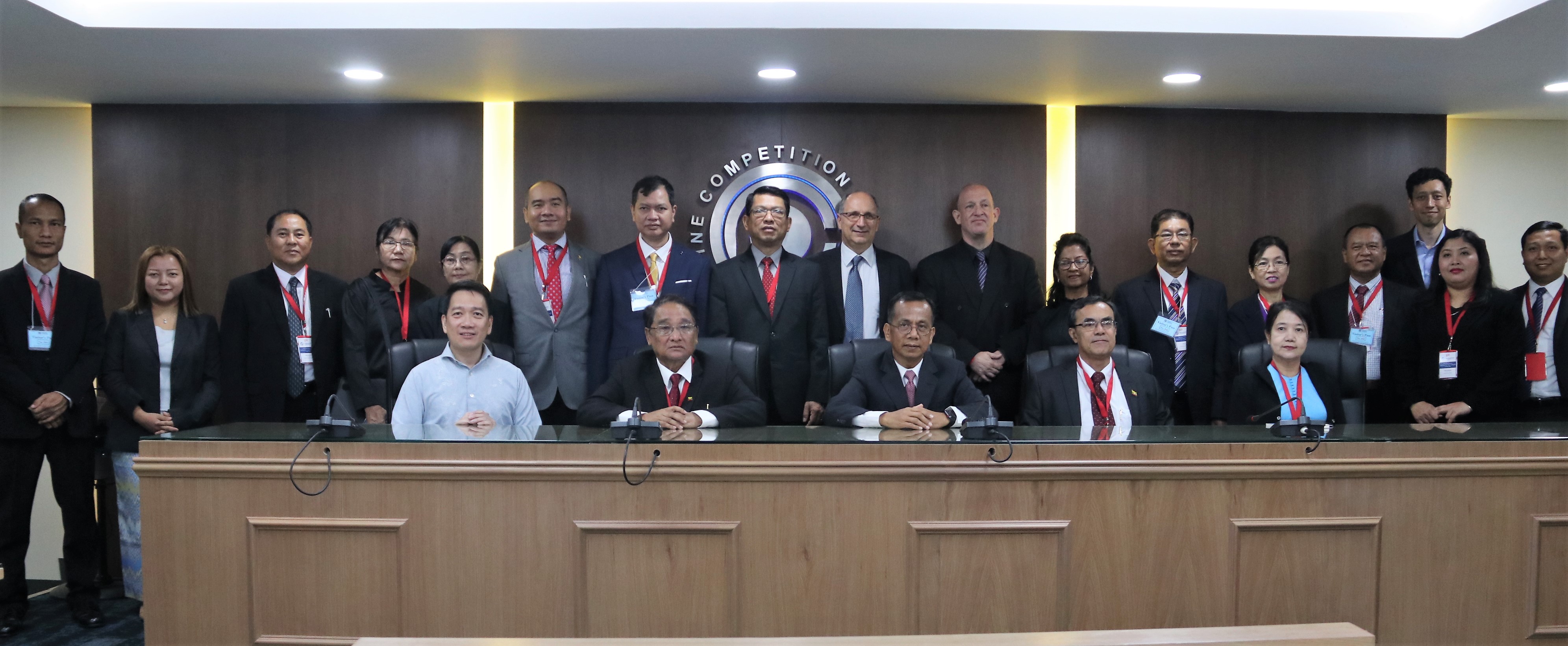
In 2015, ASEAN member states Philippines and Myanmar both had their Competition Laws enacted to “ensure a level playing field and to build a culture of fair competition among businesses”. The enforcement of Republic Act 10667, also known as the Philippine Competition Act, gives the independent quasi-judicial body powers over legislation, judicial decisions, and regulations that help foster, protect and enhance market competition in the country. On the other hand, Myanmar has yet to hear more experiences and learn strategies of its counterparts that can be adapted in successfully enforcing the Competition Law in their country.
On 7-8 May, the 14-member delegation from Myanmar Competition Commission (MmCC), led by Minister for Commerce, Chairman Than Myint, visited the Philippines for a study trip. They were received by the Philippine Competition Commission (PCC), welcomed by Chairman Arsenio Balisacan and other Commissioners, as the sessions were held in their office for two consecutive days.
The session started with the PCC office tour.
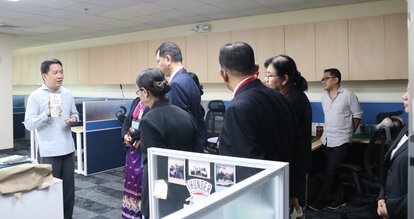
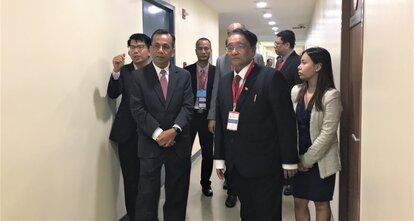
Balisacan was pleased when he welcomed the delegation, and empathized by saying: “What they are experiencing now is what we experienced when we were starting. They are facing many challenges in growing the Competition Commission and making their law effective and beneficial for the Myanmar economy and society.” Moreover, he committed to work in partnership with other ASEAN countries to grow together and promote competition policy in the region.
Present in the panel were Mr. Frank Tibitanzl, Project Director of GIZ- COMPETE, and external experts on Competition Law, Ms. Shila Dorai Raj and Mr. David Fruitman.
“The idea of this study trip came up two years ago”, shared Tibitanzl.
He expressed admiration for PCC because of its good development in the last three years, stating that “this is one of the best progresses” he has seen in his twenty years with GIZ. “Enforcement of competition law is very important. The challenges remain on the companies’ understanding and development of technologies. Therefore, advocacy and good narration to public is very important,” he added.
On behalf of Friedrich Naumann Foundation Myanmar, Wolfgang Heinze, Country Director of the Philippine project, gave a background on the Foundation’s work in the Southeast and East Asian region., He explains that “(our work-) it’s not only about democracy and human rights, but also about having a functioning competition system because only then is it possible to have a thriving economy which benefits all.”
Passing on experiences from one young institution to another
The series of lectures began with Chairman Balisacan who went through PCC’s timeline - from the enactment of the Philippine Competition Act in July 2015, establishing an actual office, up to period when issuances were released to the public. PCC celebrated its third anniversary in February 2019. He also explained a number of events in reference to the economic ecosystem, specifically pointing out that competition is part and parcel of Philippines’ development strategy.
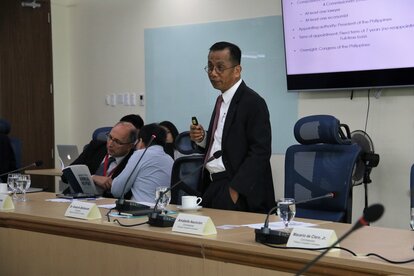
More discussions were facilitated by Commissioners Amabelle Asuncion and Macario De Claro Jr on the procedures in handling anti-competitive mergers and acquisitions and enforcement of Competition Laws.
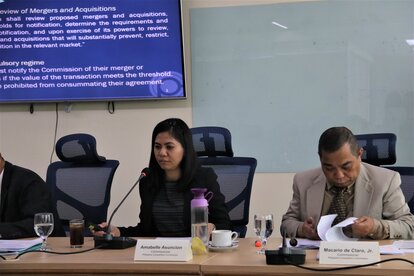
Just like any functioning organization, PCC gives value to its core – the structural formation. At the moment, there are around 170 persons working in the Commission. Part of the structure is also being able to identify the stakeholders and the effective approaches on how to engage with them in promoting and enforcing competition law in the Philippines. Being a young government body, Commissioner Johannes Bernabe encourages MmCC to challenge the public’s misconstrued view on competition as putting limits to economic growth. “It is not actually bad to have a big market share, what is bad is when you abuse your position,” Commissioner Bernabe said.
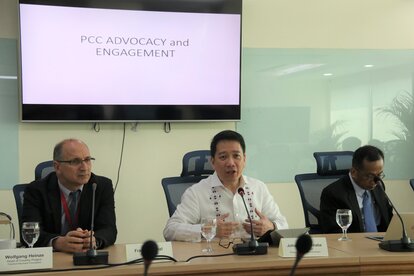
MmCC also discussed with the different Operations Offices on Competition Enforcement, Mergers and Acquistions, and Economics on how duties are being done.
Providing outside perspective are legal counsels who have handled various cases concerning Competition Law. Anthony Abad of Abad Alcantara and Associates explains the dilemma of practicing in this field where one has to promote competition, but at the same time, is also expected to defend clients. Other counsels agreed in saying that the law still needs time to mature. Work needs to be done in making the public aware and understand the value of enforcing it.
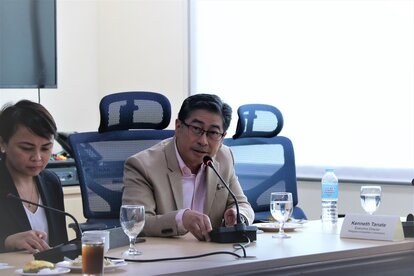
Insights from Myanmar
Since the reign of quasi-civilian government began in 2011, Myanmar has achieved significant economic growth, and GDP per capita has tremendously increased because of policy liberalization and reform processes. But, small and medium enterprises (SMEs), which contribute 99% of the country’s businesses, are still struggling in areas such as production and economic competitiveness, resulting in trade deficits for consecutive years.
For the purposes of contributing to the country’s economic freedom and development including promotion of market economy, SME development and competitiveness of the local businesses, FNF Myanmar has cooperated with government institutions to provide policy recommendations and technical assistance. The study visit of MmCC to the Philippines is one of the initiatives taken in this direction to promote a functioning competition policy – from drafting its regulations to implementation stage. The Commission was appointed only six months prior to this trip.
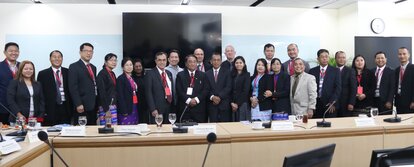
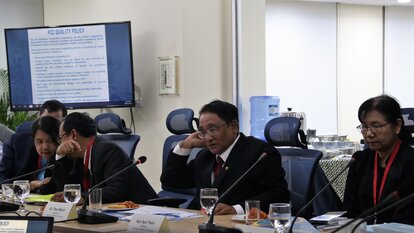
This study visit received positive feedback from the MmCC Director General Ms. Aye Aye Win, who was impressed with the structure of PCC, from its personnel composition to the strategies taken as an organization. Among the impressive inputs Win cited was the way “they target their mission and vision”. She also commended PCC for publishing their yearly guidelines, annual report, and notification. “So very useful. [Departments and office have] very qualified people and also I found them very involved in this office,” Ms. Win said.
Deputy Chairman of the MmCC Mr. Than Maung admits that the law is new to the Myanmar society, as well as legal personas, which is why they have yet to “discuss, scrutinize, review and study” the subject more in depth. He noted the next steps for the Commission would be drafting the rules and implementation, forming inquiry committees and identifying the suitable person to be in charge. “We have to take the lessons from the other commissions – their laws, rules, decisions and precedence,” Than added.
Collaboration towards competitiveness
As one of the young competition authorities in the region, the PCC, headed by Chair Balisacan, was pleased to be able to help and share their experiences to their counterparts. It is the Philippines’ responsibility as a member of the ASEAN to contribute to other members, especially those who are coming in later in the field of competition policy, because in the end, “a prosperous ASEAN community is prosperity for individual countries”.
“It is through these collaborations across borders that FNF is able to attribute its fruitful international work, in a way where knowledge and experience is being transferred from one successful group to another. In the case of Philippines and Myanmar, both countries have young competition agencies that play crucial roles, allowing fair opportunities to businesses and consumers alike, as drivers of economic growth,”Wolfgang Heinze highlighted.
This study visit is co-organized by Friedrich Naumann Foundation Myanmar and Philippine offices, Deutsche Gesellschaft für Internationale Zusammenarbeit (GIZ) – COMPETE project, Philippine Competition Commission and Myanmar Competition Commission.